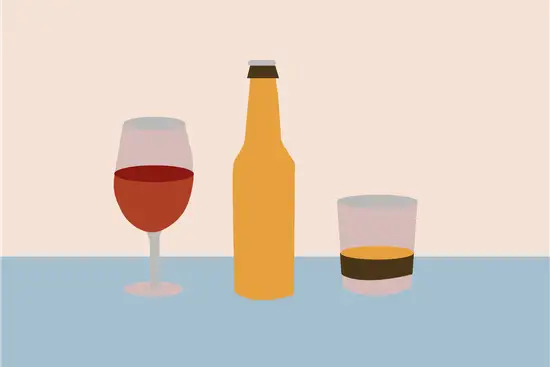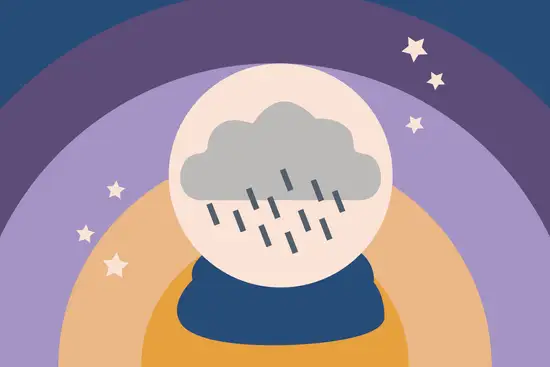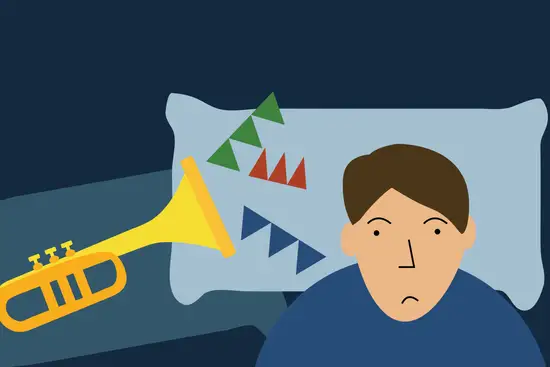When we think of the key factors controlling our weight, most of us probably think of diet and exercise. We all know that we have to try to eat healthily and that it’s important to take regular exercise if we want to keep our weight in check. But it might be interesting to learn that there’s a third factor which is just as important and often overlooked: sleep.
Getting good quality sleep is equally as important as diet and exercise in regulating our weight.
Poor sleep can negatively impact all facets of our life but our weight is one area that we might not realise is being affected. Yet it’s well established that lack of sleep is a risk factor for weight gain and obesity1.
We all sleep badly from time to time and we can all relate to the feelings of fatigue that are part and parcel of a poor night’s sleep. Because of this, good intentions can often go out of the window the following morning.
Do you ever wake up after a sleepless night and say to yourself:
- “I’m tired, so I don’t feel like exercising. Another day maybe…”
- “I was going to eat healthily today but I’m so tired. I need coffee and biscuits to give me some energy.”
- “That list of things I wanted to get done today? It can wait. I need a sofa day…”
- “I think I’ll treat myself to some nice comfort food to help me get through this tired old day.”
Do any of these sound familiar? Take any of the above statements and it becomes obvious how they could impact your weight over time.
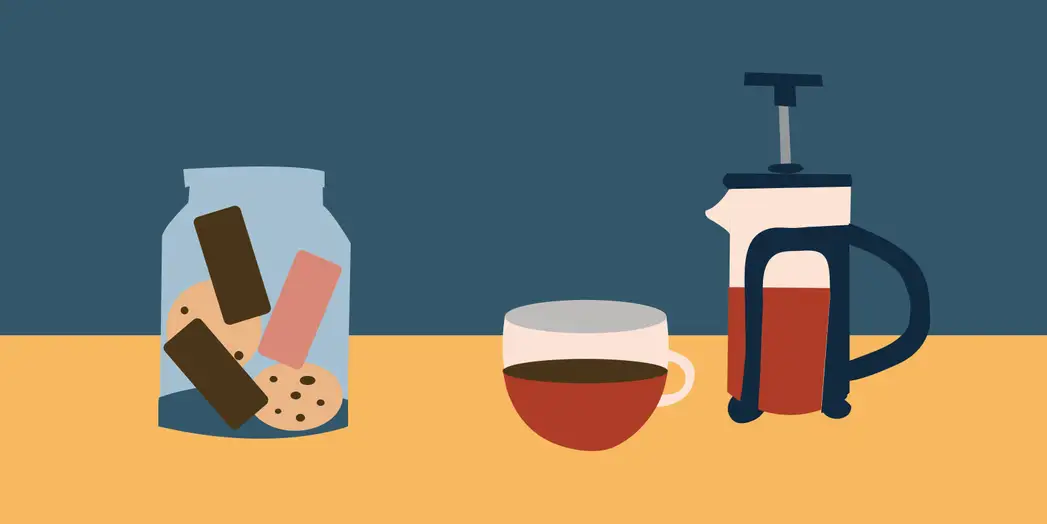
When we’re sleep-deprived, we’re less motivated to exercise and get things done. We make poor food choices and we’re more likely to pick sugary or fatty foods over healthy options.
But why do we lose willpower and what is it about a lack of sleep that makes us pick a cake over a salad?
For this article, we’ve looked at studies investigating the links between weight and sleep. We’ve also examined the science behind the biological processes at play.
Read on to find out about what is going on with our minds and bodies when we’re sleep-deprived. Discover what causes us to gain weight and how improving your sleep can have a major – and positive – impact on your waistline.
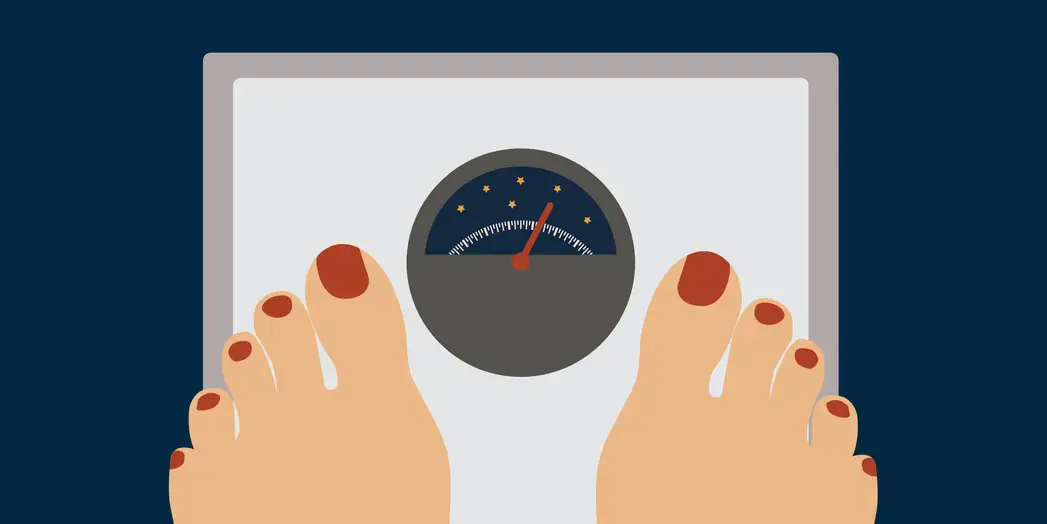
Sleep less, weigh more
Numerous studies have looked at the link between sleep and weight. Overall, the results show that if we get less sleep than we need, our weight tends to increase2.
A recent clinical trial showed that when people were sleep-deprived:
- they ate significantly more calories.
- they had a preference for fatty foods.
- their energy expenditure did not change3.
Participants ate, on average, 300 extra calories per day when sleep-deprived and most of this extra intake was accounted for by fats.
Another study collated data from more than 170 participants subjected to partial sleep-deprivation and the results showed that just a single night of inadequate sleep led to eating, on average, an extra 385 calories the next day4.
Yet, while participants took in extra calories when sleep-deprived, they did not expend any extra energy. When this pattern continues for several days, the net result is weight gain. In fact, taking in as little as 200 extra calories a day can lead to meaningful weight gain.
To put this in perspective, one pound of fat is the equivalent of 3,500 calories. So fewer than 10 days of sleep-deprivation could lead to you gaining one pound of weight if you eat in a way that a sleep-deprived person would. That’s a potential gain of just under three stone per year!
When we eat also appears to be important. Another study found that people who would be considered as ‘night owls’, whose activity peaks late in the day and who go to bed much later than most, also have a higher risk of weight gain. Late sleepers were found to consume nearly 250 calories more than ‘normal’ sleepers. They also consumed more fast food and less fruit and vegetables5.
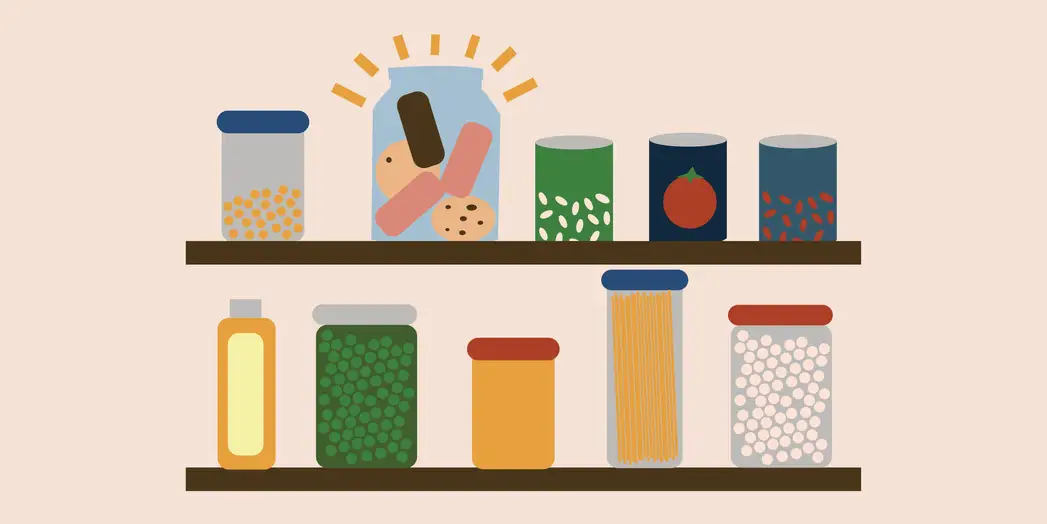
So why do we reach for the high-calorie foods when we’re tired?
It’s probably a behaviour banked from way back in our evolution.
A sleep-deprived caveman may have needed the extra energy to keep alert to danger. However, in our modern world, where calorie-rich food is abundant, and dangerous beasts less so, this behaviour now backfires on us.
The exact mechanisms governing sleep and weight gain are not completely understood. But there is a wealth of data that shows how sleep deprivation alters biological processes in our bodies, how our brain functions and how we behave in our day to day lives. Looking at the the various components, then, we see that in the:
Brain
- Willpower is reduced ↓
- Pleasure and rewards centre signalling is enhanced ↑
Body
- Low leptin makes feelings of fullness decrease ↓
- High ghrelin makes feelings of hunger increases ↑
Behaviour
- Less inclined to exercise ↓
- More inclined to sit and do nothing ↑
While it makes it easier to see the different effects by grouping into these three separate categories, in reality all three interact. The body sends chemical signals to our brain. Our brain processes these messages and we react in certain ways.
Now, we’ll look in greater detail at what’s known about how sleep deprivation affects our bodies and minds, as well as how the interaction between them can play havoc with our weight.
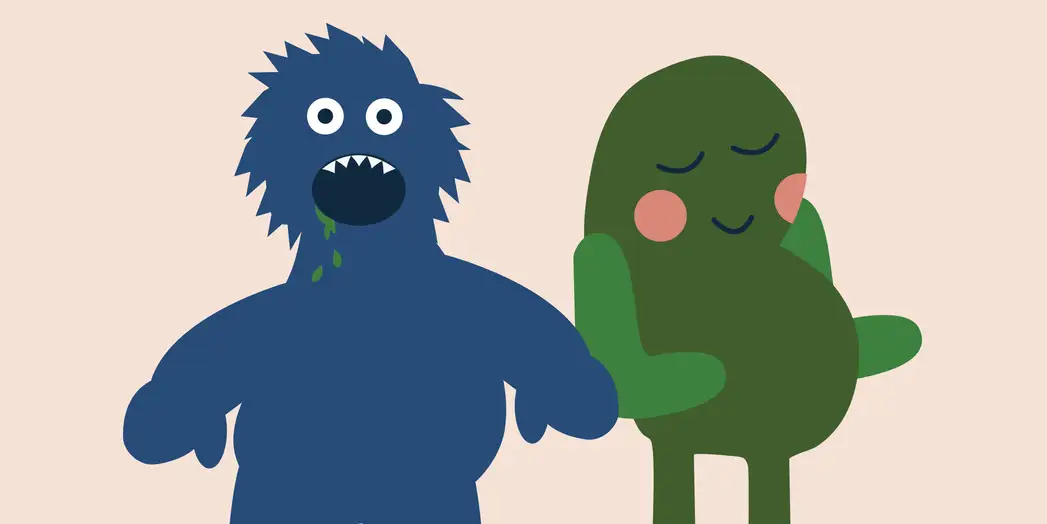
Hormones and groans – why tiredness sends out the wrong signals
Hormones are chemicals that act as messengers to send signals from one part of our body to another. Many of our hormones are affected by lack of sleep, with several identified as being directly involved in why we gain weight when we don’t sleep well.
Two such hormones are known to be important for regulating our drive to eat. These are ghrelin and leptin 6 7. They have roughly opposite effects: ghrelin makes us feel hungry and leptin is mostly responsible for making us feel full. In this way, ghrelin is our signal to go and eat and leptin tells us when to stop.
Leptin
Leptin is mainly produced by fat cells in the body and it works to regulate our fat levels by controlling appetite. The amount of leptin released is directly related to the amount of fat in the body. More fat equals more leptin.
In a healthy person carrying excess fat, leptin levels increase and this signals the brain to reduce appetite accordingly. The body can then use some of the fat stores to power itself, thus lowering the levels of stored fat7.
↑fat cells → ↑levels of leptin→ ↑signals to the brain → appetite ↓
When we get enough sleep, leptin levels should increase steadily during the night, peaking around 2am. This gradual rise during the night may have evolved so that we don’t feel hunger when we should be sleeping8.
Many studies have looked at how leptin levels are affected by sleep duration and the consensus seems to be that leptin levels decrease in sleep-deprived individuals 9.
When we fail to get enough sleep our leptin levels remain low. The brain believes that the body needs to take in more energy.
The brain then sends hunger signals and we end up eating — even though we don’t actually need the energy! The calories taken in are stored as fat because the body thinks that it needs to build up reserves.
Ghrelin
Ghrelin is mostly made in the stomach and is known as the ‘hunger hormone’ because it’s responsible for making us feel hungry.
Just before we eat, ghrelin levels in the blood increase and this is thought to give rise to the hunger pangs which prompt us to eat. Once we’ve eaten, our ghrelin levels decrease8.
What we eat affects ghrelin levels: carbs and proteins lead to a greater decrease in ghrelin than fats, so healthier options may leave you feeling fuller than, for example, a fast-food burger.
When we sleep, our ghrelin levels naturally decrease because our bodies don’t need to burn as many calories when we’re not active. But when we don’t get enough sleep our ghrelin levels don’t decrease as much as they should. Feelings of hunger persist even when the body doesn’t need more calories.
So by altering these two key hormones, sleep deprivation leaves us feeling both hungrier and also less full that we actually are. It’s not hard to see how this situation can – and will – lead to weight gain.
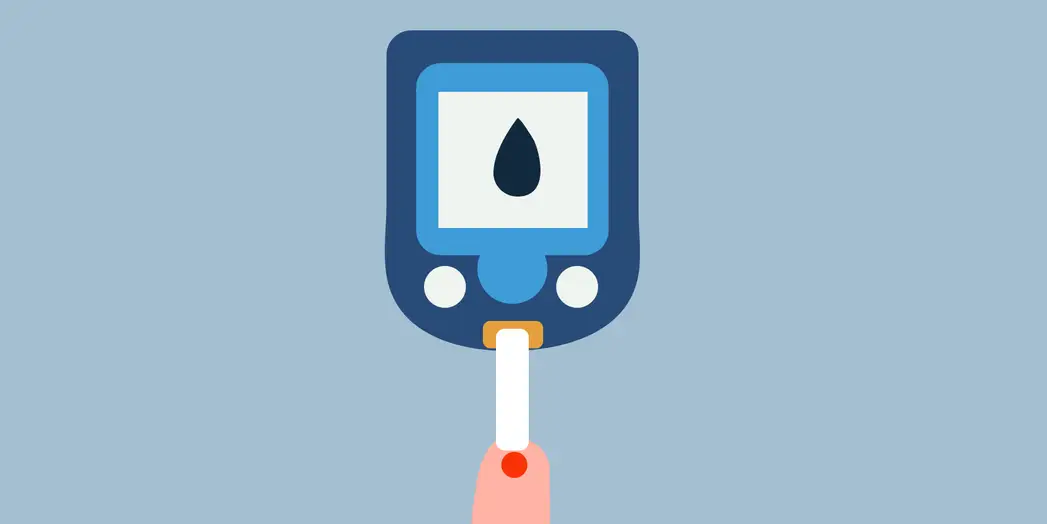
Sleep and diabetes
Insulin is another key hormone known to be affected by lack of sleep. Type 2 diabetes is caused when our bodies failing to respond to insulin. When we think of insulin, we tend to focus on its essential role in regulating our blood sugar levels. Less well-known is that it’s also critically important for controlling our fat storage.
Insulin release is the signal that tells our cells to take in sugar which they then use for energy. But it’s also the signal for cells to start making fat for our bodies to store. The more insulin in the body, the more fat storage that occurs.
Studies have shown that fat cells are less responsive to released insulin in people who are sleep-deprived 10 11 12 13. This is known as ‘insulin resistance’ and is a starting point for developing type 2 diabetes.
In fact, when healthy volunteers were subjected to sleep deprivation in the lab, the way their fat cells behaved mirrored what is seen in type 2 diabetes 11. One study showed that a single night of sleep deprivation could lead to insulin resistance 14 while another study showed changes consistent with prediabetes (where blood sugar levels are higher than normal, but not quite high enough to be considered diabetic) after only three weeks of sleep deprivation12.
So we can see that when we aren’t getting the sleep we need, these three hormones — leptin, ghrelin and insulin (plus a few others not mentioned here) — signal to our bodies that we need to store fat. Our bodies are trying to ensure that we have enough energy to survive in our sleep-deprived state but the net result may be weight gain.
The fun doesn’t end here though! How our brains work during sleep deprivation also adds to this sleep-deprived, weight-gain party.
Sleep and the brain: there’s a party vibe going on up here
What happens in the brain during sleep deprivation has been extensively studied and it’s well-known that getting inadequate sleep can have quite profound effects on how our brains work. In a nutshell, we lose self-restraint and we crave pleasant things. We’ll explore why next.
Many studies use brain scans to look at how the brain responds to food or images when sleep-deprived compared to sleep-rested 15 16 17. These studies can provide us with really detailed information about what’s going on in which part of the brain during sleep deprivation.
When it comes to weight gain, brain imaging scans have shown that there are two key regions that are shown to be affected by sleep deprivation. These are the prefrontal cortex and the amygdala.
The prefrontal cortex is particularly sensitive to sleep deprivation15 and is important for:
- memory
- attention-span
- problem-solving
- decision-making
- self-control (amongst many other functions)16.
When we’re sleep-deprived, activity in this region is reduced, so we’re not as good at making complex decisions and showing self-control and our willpower is reduced.
Why willpower matters
As we’ve seen, self-control and willpower are central to controlling your weight.
A few examples are:
- Self-control: salad or McDonalds?
- Complex decisions: should I eat a few crisps, one small pack or the whole family-sized bag?
- Willpower: I WILL exercise…tomorrow…maybe?
Yet while activity in the prefrontal cortex is dampened, the opposite is occurring in other areas of the brain such as the amygdala, which is important for processing of emotions. There is increased activity in this area in sleep-deprived individuals, indicating that our emotions are heightened during sleep deprivation.
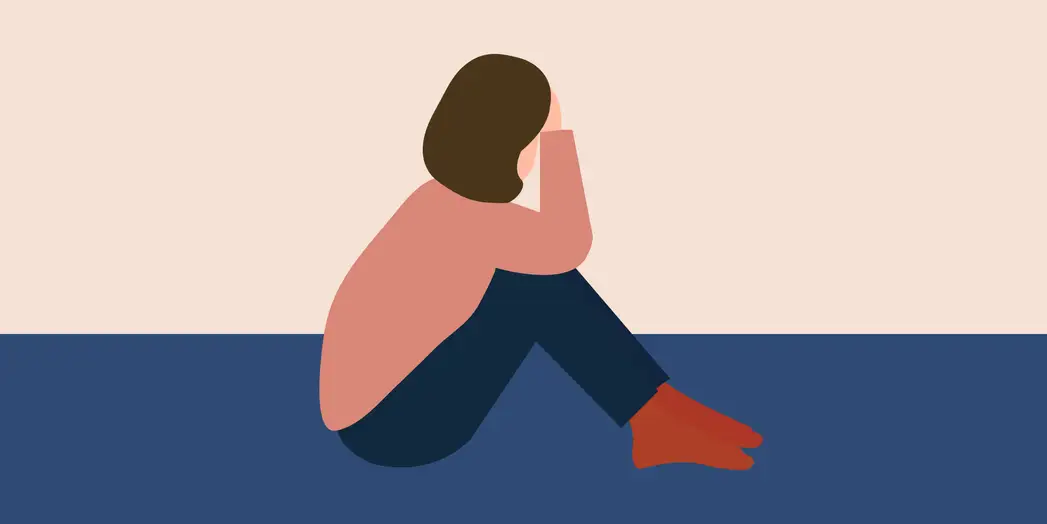
How sleep affects our emotions
In one brain imaging study, subjects were assigned into either a normal sleep group or a sleep-deprived group. In the latter, no sleep was allowed from the start of one day, through the night and during the course of the next day (just under 32 hours without sleep).
Both groups were then asked to look at images and rate them as either pleasant or neutral, while their brain activity was examined by MRI scanning.
Sleep-deprived subjects were significantly more likely to rate the images as pleasing compared to the subjects who had had a good night’s sleep. When their brain activity was examined, this corresponded with an enhanced activation of the pleasure and reward centres.
So what does this mean exactly? When we’re sleep-deprived, a part of the brain called the amygdala, which is involved in the regulation of emotions and emotional behaviour, becomes much more responsive to things perceived as pleasing (for example, sitting on a sofa watching TV) and those that are rewarding (eating sweets)7.
Our brain’s reward system uses both the prefrontal cortex and the amygdala and drives our behaviour towards things we like (such as food, alcohol and fun activities) and away from things that we don’t (pain, conflict and tasks we’d rather put off).
How the reward system works
We have a bag of sweets and eat one. The reward and pleasure centres of our brain tell us that this is good. So we have another because we now know that when we eat this thing, the result is a pleasant sensation (it tastes nice).
In a person who has had adequate sleep, at some point another part of the brain will intervene and remind the person that too many sweets are bad for their teeth and waistline. The behaviour is checked and the sweets put away for another time.
In someone who is sleep-deprived, two factors are at play. Signals at the reward centres are amplified. So, when the person eats the sweet, the sensation is more intense and the drive to eat more is increased.
Secondary to this, the prefrontal cortex (the part of the brain responsible for reminding us that too many sweets isn’t a good thing) is dampened. So the signal to stop is weaker. In effect, our willpower is weaker.
In this example, the sleep-deprived person keeps on eating. The end result is a net calorie intake that is much higher for the sleep-deprived person compared to the person who got enough sleep.
What tired Swedish men can tell us about our food habits
A recent study in Sweden looked at the effects of sleep deprivation on the grocery shopping habits in a group of men. After a night of either normal sleep or restricted sleep, the men were sent food shopping. In their sleep-deprived state, they bought significantly more food and their choices were more calorie-rich than when not sleep-deprived15.
What this illustrates nicely is that we are programmed to search out more calories when we are sleep-deprived. Not only do we eat more, what we choose to eat is also affected. Several studies have demonstrated that when we are sleep-deprived, we crave more calorie-dense foods 9.
If you think about it, how often after a bad sleep do you crave a healthy salad over something satisfying, comforting and calorie-rich?
In yet another brain-imaging study, participants were either allowed to sleep as normal (sleep-rested) or kept awake for 24 hours (sleep-deprived). They were then shown images of food and asked to rate them in terms of how much they wanted to eat them15.
The sleep-deprived participants were significantly more likely to choose high-calorie foods over healthy foods. How much someone favoured calorie-rich food over healthy food was proportional to how sleep-deprived they were.
What was happening in their brains was that regions of the frontal cortex — important for decision making — showed reduced activity. Making complex decisions was harder.
At the same time, deep in the brain, areas in the reward centre were more active than usual, which made desire stronger. So our drive towards calorie-dense food is extremely strong when we’re lacking sleep.
So, the less you sleep, the greater the preference for high-calorie food choices. Our hormones tell us to take in calories, our brains lose the ability to say no to our cravings and our behaviour tells us to save the exercise for another time and do some relaxing.
It seems like a pretty hopeless situation. But there’s one simple fix.
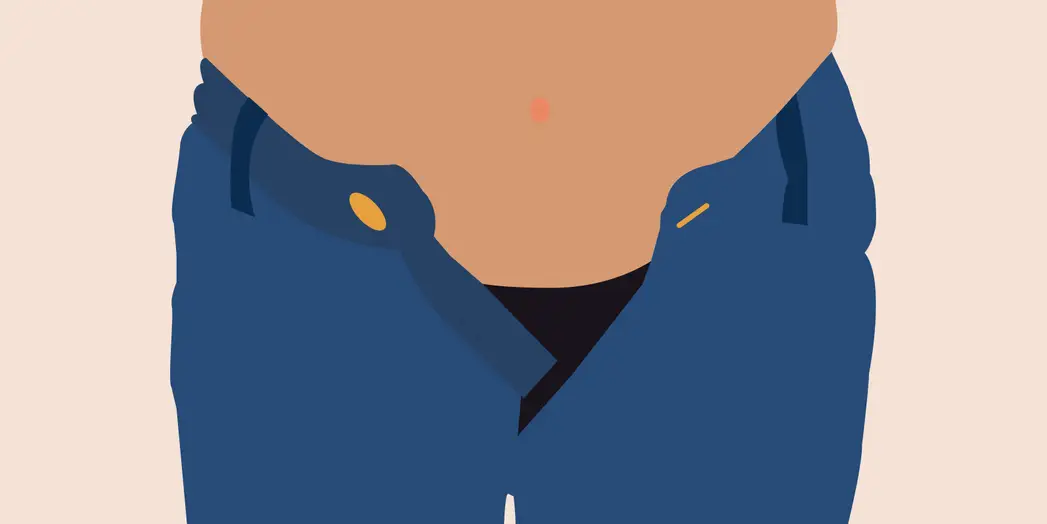
The good news
While lack of sleep can wreak havoc with our bodies’ ability to control our weight, it’s not all doom and gloom. Research is beginning to show that by improving our sleep and getting sufficient sleep, it’s possible to reverse these effects 14 18 19 20.
For example, one very encouraging study has shown that when we do get enough sleep, we consume significantly less sugar21. Subjects in the control group carried on with their normal sleep routine. A second group received help and advice to increase the amount of time they spent asleep.
Both groups also completed food diaries. At the end of the study, the second group had slept more but their eating habits had also been affected.
Consumption of fats and carbohydrates was also slightly lower in this group, compared to the control group. But consumption of free sugars (sugars that are added to food and drink and those naturally present in honey, syrups and fruit juices) was significantly less, with the longer sleepers now consuming 10g per day less than the baseline values.
A recent study also looked at sleep extension as a possible way of reducing weight and symptoms of type 2 diabetes in adolescents. The results showed significant weight reduction when patients were helped to get adequate sleep18.
Sleep is worth its weight in gold
You can see that by taking steps to improve your sleep, you also get the added benefit of better controlled weight. If you feel that you’re struggling with your sleep, talk to us here at Sleepstation. We’ll work with you to get to the root of your sleep problem and to address what’s coming between you and a good night’s sleep.
If you have a sleep problem and have noticed that your weight’s been creeping up you might find yourself pleasantly surprised that, by improving your sleep, you can also gain better control over your willpower, food choices and, ultimately, your weight!
In summary
- Failing to get the sleep your body needs can result in unwanted weight gain.
- Hormones important for hunger and satiety are disrupted, making us feel hungrier and less full.
- Our willpower and self-control are reduced, leading us to make poorer food choices.
- Pleasure centres in the brain are more sensitive, making us reach for more sugary, fatty and calorie-rich food in our sleep-deprived state.
- Happily, all of these effects can be easily reversed by taking steps to improve your sleep.
References
- Patel S, Hu F. Short Sleep Duration and Weight Gain: A Systematic Review. Obesity. 2008;16(3):643-653. ↩︎
- Ogilvie R, Patel S. The epidemiology of sleep and obesity. Sleep Health. 2017;3(5):383-388. ↩︎
- St-Onge M, Roberts A, Chen J, Kelleman M, O’Keeffe M, RoyChoudhury A et al. Short sleep duration increases energy intakes but does not change energy expenditure in normal-weight individuals. The American Journal of Clinical Nutrition. 2011;94(2):410-416. ↩︎
- Al Khatib H, Harding S, Darzi J, Pot G. The effects of partial sleep deprivation on energy balance: a systematic review and meta-analysis. European Journal of Clinical Nutrition. 2016;71(5):614-624. ↩︎
- Baron K, Reid K, Kern A, Zee P. Role of Sleep Timing in Caloric Intake and BMI. Obesity. 2011;19(7):1374-1381.
↩︎ - Copinschi G, Leproult R, Speigel K. The Important Role of Sleep in Metabolism. Frontiers of Hormone Research. 2014;42:59-72. ↩︎
- Prinz P. Sleep, Appetite, and Obesity—What Is the Link?. PLoS Medicine. 2004;1(3):e61. ↩︎
- Meier U, Gressner A. Endocrine Regulation of Energy Metabolism: Review of Pathobiochemical and Clinical Chemical Aspects of Leptin, Ghrelin, Adiponectin, and Resistin. Clinical Chemistry. 2004;50(9):1511-1525. ↩︎
- Pan W, Kastin A. Leptin: A biomarker for sleep disorders?. Sleep Medicine Reviews. 2014;18(3):283-290.
↩︎ - Buxton O, Pavlova M, Reid E, Wang W, Simonson D, Adler G. Sleep Restriction for 1 Week Reduces Insulin Sensitivity in Healthy Men. Diabetes. 2010;59(9):2126-2133. ↩︎
- Broussard J, Ehrmann D, Van Cauter E, Tasali E, Brady M. Impaired Insulin Signaling in Human Adipocytes After Experimental Sleep Restriction. Annals of Internal Medicine. 2012;157(8):549. ↩︎
- Buxton O, Cain S, O’Connor S, Porter J, Duffy J, Wang W et al. Adverse Metabolic Consequences in Humans of Prolonged Sleep Restriction Combined with Circadian Disruption. Science Translational Medicine. 2012;4(129):129ra43-129ra43. ↩︎
- Leproult R, Van Cauter E. Role of sleep and sleep loss in hormonal release and metabolism. Endocrine Development. 2010;17:11-21. ↩︎
- Donga E, van Dijk M, van Dijk J, Biermasz N, Lammers G, van Kralingen K et al. A Single Night of Partial Sleep Deprivation Induces Insulin Resistance in Multiple Metabolic Pathways in Healthy Subjects. The Journal of Clinical Endocrinology & Metabolism. 2010;95(6):2963-2968. ↩︎
- Verweij I, Romeijn N, Smit D, Piantoni G, Van Someren E, van der Werf Y. Sleep deprivation leads to a loss of functional connectivity in frontal brain regions. BMC Neuroscience. 2014;15(1):88. ↩︎
- Greer S, Goldstein A, Walker M. The impact of sleep deprivation on food desire in the human brain. Nature Communications. 2013;4(1). ↩︎
- Gujar N, Yoo S, Hu P, Walker M. Sleep Deprivation Amplifies Reactivity of Brain Reward Networks, Biasing the Appraisal of Positive Emotional Experiences. Journal of Neuroscience. 2011;31(12):4466-4474.
↩︎ - Moreno-Frías C, Figueroa-Vega N, Malacara J. Sleep Extension Increases the Effect of Caloric Restriction Over Body Weight and Improves the Chronic Low-Grade Inflammation in Adolescents With Obesity. Journal of Adolescent Health. 2020;66(5):575-581. ↩︎
- Leproult R, Deliens G, Gilson M, Peigneux P. Beneficial Impact of Sleep Extension on Fasting Insulin Sensitivity in Adults with Habitual Sleep Restriction. Sleep. 2015;38(5):707-715. ↩︎
- Killick R, Hoyos C, Melehan K, Dungan G, Poh J, Liu P. Metabolic and hormonal effects of ‘catch-up’ sleep in men with chronic, repetitive, lifestyle-driven sleep restriction. Clinical Endocrinology. 2015;83(4):498-507.
↩︎ - Al Khatib H, Hall W, Creedon A, Ooi E, Masri T, McGowan L et al. Sleep extension is a feasible lifestyle intervention in free-living adults who are habitually short sleepers: a potential strategy for decreasing intake of free sugars? A randomized controlled pilot study. The American Journal of Clinical Nutrition. 2018;107(1):43-53. ↩︎
